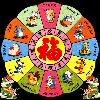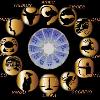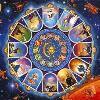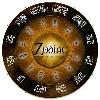

Tags: Zodiac View |
they arrived The Chinese believe the animal ruling the year in which a person is born has a profound influence on personality saying This is the animal that hides in your heart Chinese New Year Origins Tags: Zodiac View |
I know you all will find this pretty interesting Your foreplay according to the stars wg Mine says I like it in a hot tub BINGO Especially if there are a lot of candles to light the Tags: Zodiac View |
|||||||||
|
Tags: Zodiac View |
|
|||||||||
zodiac (Greek: ????????, z?diakos) is the ring of constellations that lines the ecliptic, which is the apparent path of the Sun across the sky over the course of the year. The Moon and planets also lie within the ecliptic, and so are also within the constellations of the zodiac. In astrology, the zodiac denotes those signs (astrological sign) that divide the ecliptic into twelve equal zones of celestial longitude. As such, the zodiac is a celestial coordinate system, to be more precise, an ecliptic coordinate system, taking the ecliptic as the origin of latitude (celestial latitude), and the position of the sun at vernal equinox as the origin of longitude (celestial longitude).
It is known to have been in use by the Roman era, based on concepts inherited by Hellenistic astronomy from Babylonian astronomy of the Chaldean period (Neo-Babylonian) (mid-1st millennium BC), which, in turn, derived from an earlier system of lists of stars along the ecliptic. The construction of the zodiac is described in Ptolemys Almagest (2nd century AD). The term zodiac may also refer to the region of the celestial sphere encompassing the paths of the planets corresponding to the band of about eight arc degrees above and below the ecliptic. The zodiac of a given planet is the band that contains the path of that particular body; e.g., the "zodiac of the Moon" is the band of five degrees above and below the ecliptic. By extension, the "zodiac of the comets" may refer to the band encompassing most short-period comets
The term zodiac derives from Latin (Latin language) z?diacus, which in its turn comes from the Greek (Greek language) langgrc???????? ?????? (z?diakos kuklos), meaning circle of animals, derived from langgrc?????? (z?dion), the diminutive of langgrc???? (z?on) animal. The name is motivated by the fact that half of the signs of the classical Greek zodiac are represented as animals as well as two mythological hybrids.
Although the zodiac remains the basis of the ecliptic coordinate system in use in astronomy besides the equatorial (equatorial coordinate system) one, the term and the names of the twelve signs are today mostly associated with horoscopic astrology.






